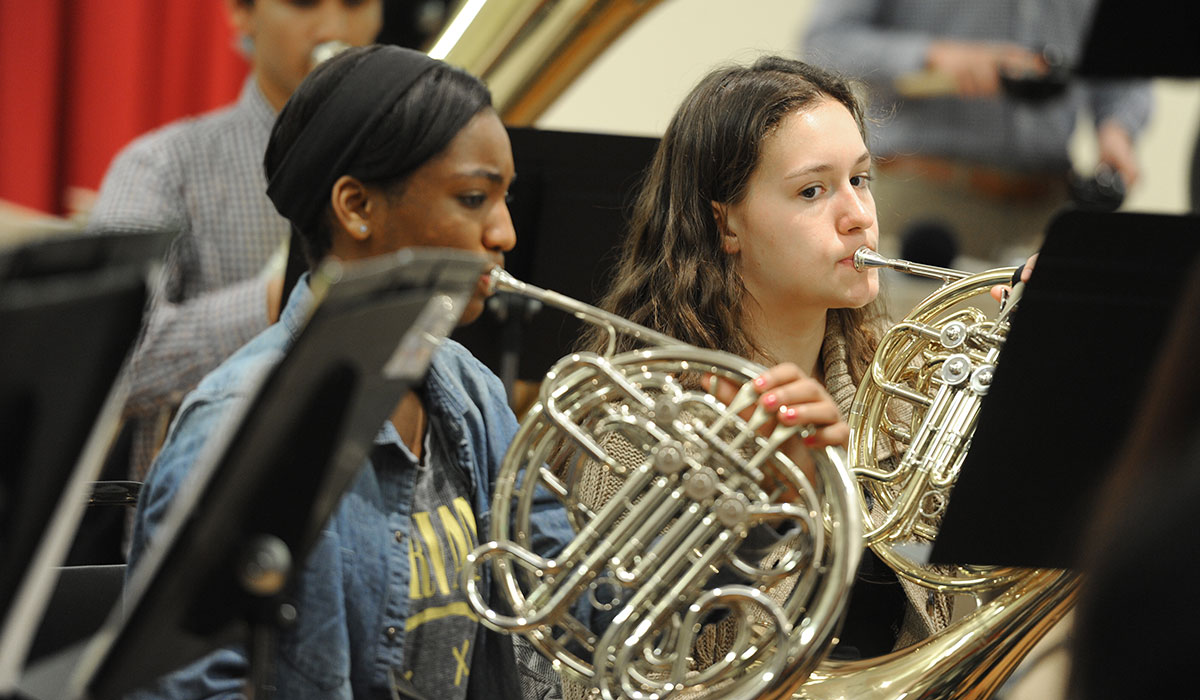
The Music Department of the Rome School of Performing Arts offers minors for non-music majors.
-
Non-Music Majors (with and without Performance)
UNDERGRADUATE MINOR IN MUSIC (with performance)
The subconcentration in music is open only to students who are not currently majors in music. Successful completion of a proficiency audition is required for the option "with performance." The audition should be ten minutes in length and include classical repertoire in three contrasting styles that best display the student's level of proficiency. Composers, in lieu of a proficiency audition, will submit original compositions for evaluation.
Program of Study
- MUS 123 Music Theory I and MUS 124 Music Theory II * 6
- MUS 178 Music in Western Civilization 3
- MUPI 3XX Applied Instruction ** 3 or 1,1,1
- MUS Two Music Electives *** 6
- MUS Performing Organization 2
Minor in Music with Performance total credits: 20
* All students must take a Theory Evaluation Test before enrolling in these courses, contact Dr. Andrew Simpson simpson@cua.edu if you have questions; a student whose exam indicates deficiencies must successfully complete Fundamentals of Music Theory (MUS 101) before being permitted to take Music Thoery I.
** Three semesters of study at one credit per semester, all credits to be taken in the same instrument, voice, or composition category. A jury examination is required each semester.
*** To be approved by the Department of Music. May include applied instruction taken at one credit or three credits per semester. Applied instruction taken at one credit per semester must add up to three or six credits in the same instrument, voice, or composition category. A jury examination is required for each semester of applied instruction.
UNDERGRADUATE MINOR IN MUSIC (without performance)
The subconcentration in music is open only to students who are not currently majors in music. No audition is required for the option "without performance."
Program of Study Semester
MUS 123 Music Theory I and MUS 124 Music Theory II * 6
MUS 178 Music in Western Civilization 3
MUS 183, 184 Class Piano ** 2
MUS Three Music Electives *** 9
Minor in Music without Performance total credits: 20
*All students must take a Theory Evaluation Test before enrolling in these courses, contact Dr. Andrew Simpson simpson@cua.edu if you have questions; a student whose exam indicates deficiencies must successfully complete Fundamentals of Music Theory (MUS 101) before being permitted to take Music Theory I.
** May be replaced with two semesters of applied piano instruction (MUPI) at one credit each, pending a successful audition for the piano faculty.*** To be approved by the Department of Music. Suggested courses include (but are not limited to) History of Music I, II (MUS 325, 326), History of Musical Theatre (MUS 385, 386), Music Theory III-IV (MUS 223, 224). May include up to three credits of applied instruction (MUPI) taken at one credit or three credits per semester, pending a successful audition for the appropriate applied faculty. A jury examination is required for each semester of applied instruction. May also include up to three credits of performing organization (at one credit per semester), pending a successful audition for the organization.
For questions about Music Minors, please reach out to our Minor Advisor, Dr. Andrew Weaver at weavera@cua.edu.
